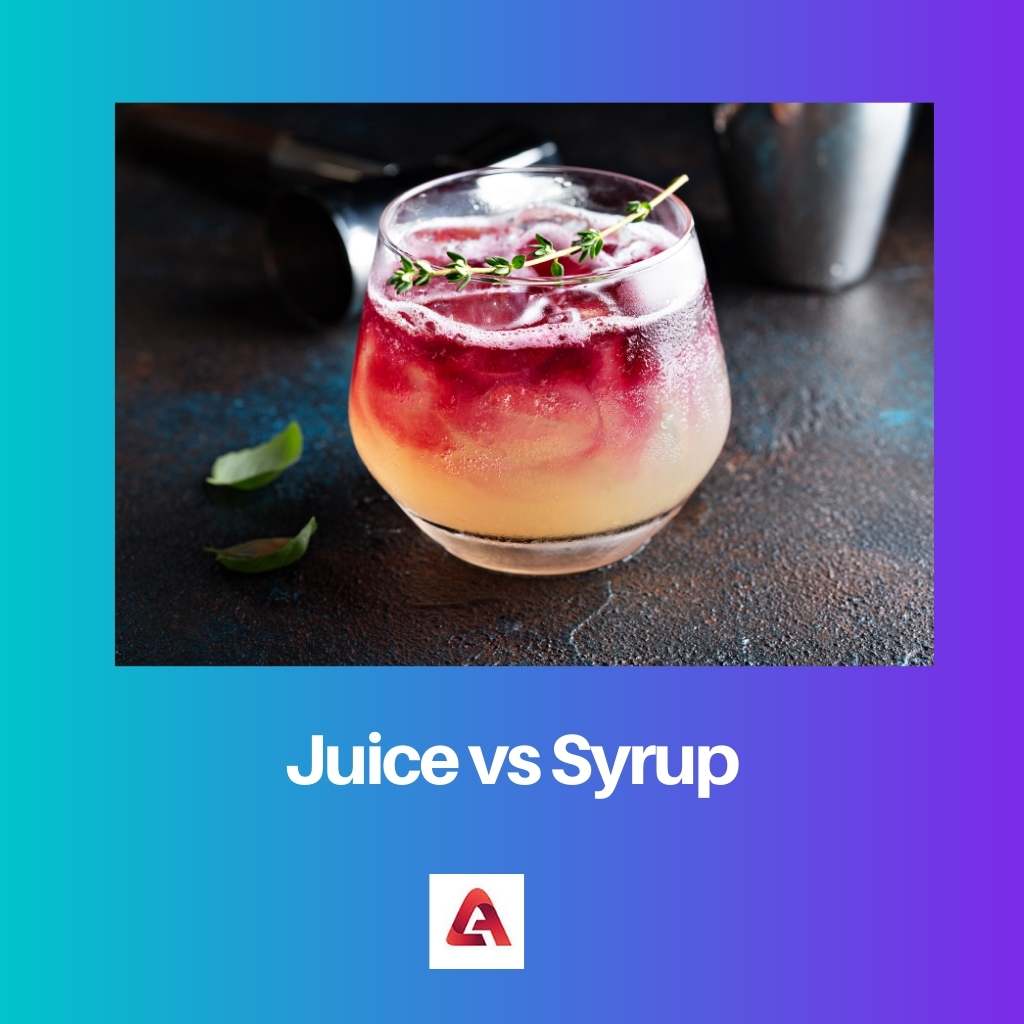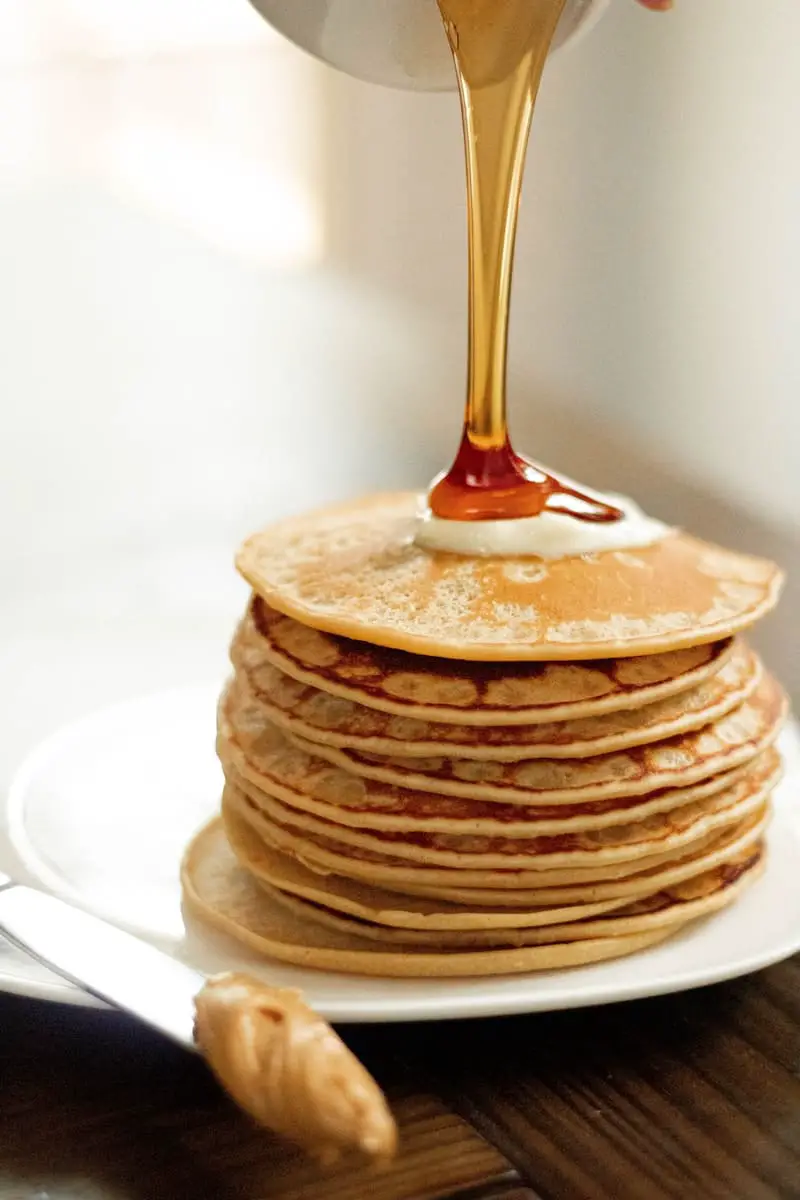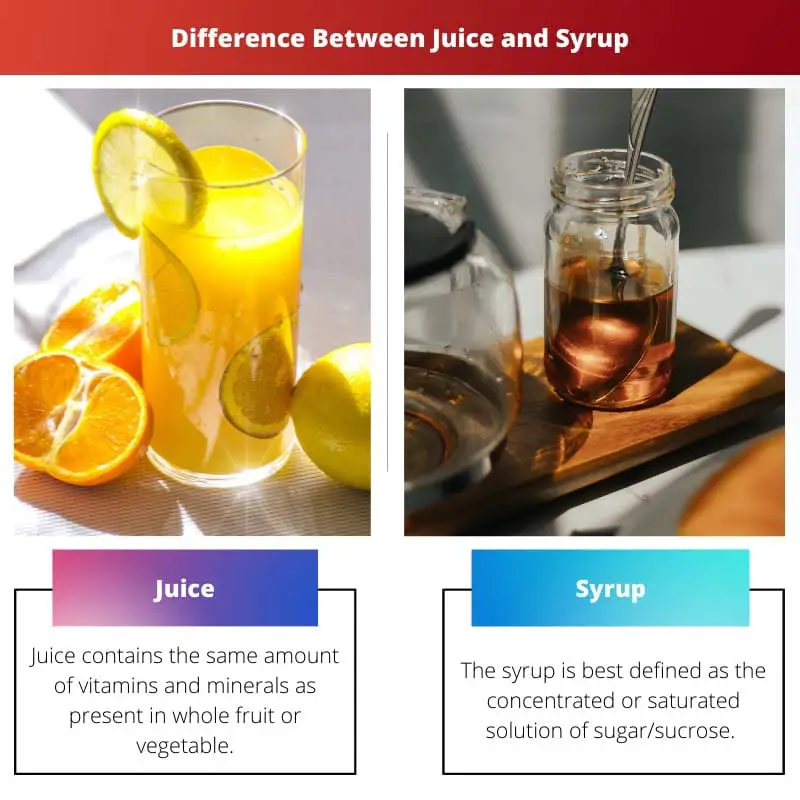We consume both juice and syrup in daily life. Various types of juices are a healthy lifestyle choice that helps us consume vital nutrition from natural fruits and vegetables.
On the other hand, the syrup has high sugar content (made by dissolving sugar in water) and hence is not an option for diabetic people. Nowadays, flavored syrups are also available in the market for better taste.
Key Takeaways
- Juice is a liquid extracted from fruits or vegetables and contains natural sugars and vitamins, while the syrup is a sweet, viscous liquid made by boiling sugar and water.
- Juice is used as a beverage or ingredient in cooking or baking, while syrup is used as a sweetener or flavoring agent in various foods and drinks.
- Juice is considered a healthier option than syrup, as it contains natural sugars and nutrients, while syrup is high in calories and artificial additives.
Juice vs Syrup
Juice is a beverage that is made by extracting liquids from fruits and vegetables. As the juice is taken from natural sources, it is rich in vitamins and nutrients. Homemade juice is a healthy alternative for people looking to lose weight. The syrup is a concentrated sugar solution made by boiling sugar in water. They are thick, sweet liquids that can be used to preserve fruits. As syrups are made with large amounts of sugar, it is low in nutritional value.

Juice contains the same amount of vitamins and minerals as present in whole fruit or vegetable. Fruit and vegetable juices should be a part of our daily diet as it doesn’t contain any fat, helps in consuming all the vital nutrition, and weight loss.
Although when juicing fruits, the fiber content is lost in the process.
Syrup is best defined as the concentrated or saturated solution of sugar/sucrose. But, nowadays, syrups are made sugar-free by replacing the main ingredient with non-sugar substitutes like glycerol and sorbitol.
Various types of syrups are available in the market, like corn syrup, maple syrup, cane syrup, etc.
Comparison Table
| Parameters of Comparison | Juice | Syrup |
|---|---|---|
| History | Evidence of extracting juice from fruits dates back to 150BC-70AD. Most civilizations used mortar and pestle for this purpose. | The first evidence of making maple syrup was documented in 1557 while it became popular during the late 18th century. |
| Production | The production of juice mainly requires extraction from the pulp of fruits and vegetables. | Heating is involved in the production of syrups. |
| Main Source | The main source of juice is varieties of fruits and vegetables. | The basic and common ingredients for making syrup are sugar and water. |
| Viscosity | Juices are comparatively less viscous than syrups. | The consistency of syrups is very thick. |
| Nutrition | Since the juice is the extraction of the liquid content of various fruits and vegetables, they are rich in nutrition and natural. | The nutrition content is not high in syrup. |
| Use | Juices are a part of a healthy diet and can help in reducing weight. | Syrups are mostly added to a drink or dessert as a sweetener or flavoring agent. |
| Sugar content | The sugar content in juices depends on the particular fruit or vegetable one is extracting it from, | Since syrups are made by boiling sugar in water, they have high sugar content. |
| Expiration | Juices expire after a few months even refrigerated. | Syrups can stay good even for more than a year. |
What is Juice?
The earliest evidence of juicing dates back to 150 BC when an ancient tribe in Israel started mashing pomegranates and figs. In many civilizations, people used mortar and pestle to extract the juice of kiwi as well.
During the early 20th century, the pasteurization of orange juice started to prevent them from spoiling by microorganisms.
It is believed that fresh juices from organic fruits and vegetables can positively cure cancer. Nowadays, many companies are making profits by selling packaged fruit juices with additives that prevent them from spoiling in a few days.
If someone is juicing at home, it should be consumed within days, even if refrigerated, because the vegetable or fruit juice can start to form mold after a few days even if refrigerated.
The taste of juices varies with the main fruit or vegetable, but manufacturers add sweeteners to improve the taste.

What is Syrup?
Maple syrup is one of the most popular syrups that the indigenous people of North America first invented. People began to boil the maple tree sap to produce maple syrup in a pot. The women in the tribes did the entire process.
Today, syrups are very common as an artificial sweetener that adds flavor to drinks. Chocolate syrup is a very common artificial sweetener used in desserts and beverages.
Unlike juices, due to the high sugar content in syrup, they can stay unspoiled for over a year. Syrups don’t have much nutrition compared to juices, but manufacturers add external nutrition.
They are also made sugar-free nowadays by replacing the main sugar source with sorbitol or glycerol. It is a better alternative as people are eventually concerned about high-sugar content, leading to several health issues.

Main Differences Between Juice and Syrup
- Juice extraction dates back to 150 BC-70AD, whereas the first syrup production was documented in 1557, while it became popular in the late 18th century.
- The juice production doesn’t require any heating, but heating is mandatory in the case of syrup.
- The main source of juice is varieties of fruits and vegetables, whereas sugar and water are the basic and common ingredients for making syrup.
- Juices are comparatively less viscous than syrups, whereas syrups have a thick consistency because of their sugar content.
- Juices are rich in nutrition (vitamins and minerals) from raw fruits and vegetables, whereas syrups don’t have more nutritional value.
- Juices are a part of a healthy diet and can help in reducing weight, whereas syrups are mostly added to a drink or dessert as a sweetener or flavoring agent.
- The sugar content in juices depends on the source of fruit or vegetable, whereas sugar content is high in syrup because of concentrated sugar.
- Juices expire faster than syrups.

- https://www.sciencedirect.com/science/article/pii/S1877705812012799
- https://www.sciencedirect.com/science/article/pii/S0011916402006045

Guys, seriously? Who cares about the ancient history of syrup and juice? This is not useful information in today’s context. There are more important things to consider than historical dates and processes.
The historical background provided is fascinating. It’s intriguing to see how far back the process of juice extraction dates. It’s also useful to understand the differences in expiration and viscosity between juices and syrups.
I didn’t know about the expiration difference between juices and syrups. This is beneficial information to be aware of. I appreciate the detailed comparison between the two.
The article clearly highlights the high nutritional value of juices over syrups. It’s interesting to learn about the production processes and health benefits associated with each option.
The article clearly states that juices are a healthier option than syrups. It’s essential to be aware of the nutritional differences between them. The syrup has low nutritional value, and I’m glad to see that there are sugar-free alternatives available nowadays.
This is a very informative article. It’s great to learn the importance of natural ingredients like juices for our health. There are also some interesting facts about the history of juice and syrup production.